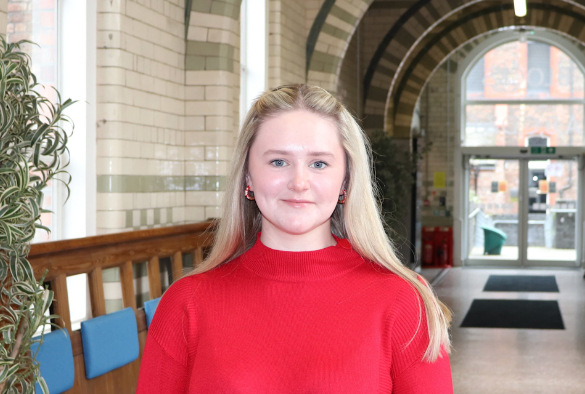
Hannah Coghlan is a third year PhD student based in the Department of Pharmacology and Therapeutics. In 2023, she undertook a Professional Internship for PhD Students with NC3Rs.
Taking my research interests out of the lab
My PhD research focuses on the mechanisms used by cells, particularly those in the liver, to protect themselves from damage caused by drugs and their intermediates. I aim to improve our understanding of how differences in these mechanisms between humans and those of the animals used in drug research might impact the results of drug safety testing. The ultimate goal is to help improve the selection, and reduce the use, of animals during drug development.
My work has the potential to contribute to the 3Rs principle – the idea that we should aim to replace, reduce and refine the number and way that animals are used in research. In April 2023 at the British Toxicology Society annual conference, I discussed this with representatives from the National Centre for the 3Rs (NC3Rs) who work with the scientific community to promote the principle. Consequently, I was lucky enough to complete an internship within the NC3Rs Toxicology and Regulatory Sciences team. Their work involves carrying out research projects to identify new areas in which the 3Rs could be implemented.
The use of animals in developing biosimilars
When a drug is being developed, companies have to show that it is both effective and safe. Sometimes a developer can do this using experiments in cells (in vitro research), while other times the best or only way to show a drug’s effectiveness and safety is by performing studies using animals (in vivo research).
Biosimilars are copy-cat versions of existing biological medicines that can be made when the patent for an existing biological medicine expires. Therefore, it might be assumed that the two versions would be equally effective and safe. However, as biological medicines have very large and complicated structures that can be affected by many factors out of our control, there is no guarantee that the exact structure and, therefore, effectiveness and safety, of a biosimilar and the original medicine are the same. As a result, companies developing biosimilars have to perform experiments directly comparing the biosimilar and original medicine to show their similarity.
The problem and the project
Medicine regulators do not always agree on whether animal studies are needed to show a new medicine’s effectiveness or safety. Because of this, drug developers often try to cover all bases by conducting animal studies, even when they might not be necessary. Some regulators have recently updated their advice to tell developers that animal studies are not always needed to show similarity between a biosimilar and the original medicine. However, this advice is inconsistent worldwide and these updates are relatively recent, so the impact of these changes is not easy to measure.
My project aimed to help NC3Rs get a better idea of how and why developers use animal tests when making biosimilars. As part of my 3-month internship, I spent time mining data from drug approval documents produced by drug regulators to identify trends in animal use and specific concerns that NC3Rs could address in a more targeted way going forward.
Heading into the future
By using publicly-available data produced by drug developers and regulators, we were able to identify some interesting, and perhaps concerning, trends in how and why animal testing is done for biosimilars. I will present the results of this project at the British Toxicology Society annual conference in April 2024 (oh, how things come full circle…) and in a publication over the coming months. I look forward to hearing how NC3Rs might utilise or develop on this work in order to promote the 3Rs in biosimilar development.
In a broader context, I’ll spend the next year completing my PhD and, hopefully, contributing to the knowledge base necessary for implementing the 3Rs in drug safety testing. My internship formed a fascinating perspective on how scientific research can have profound real-world impacts, and the skills and experience I gained during my professional internships are invaluable. There is no singular way to define an ‘expert’ – Knowledge? Interest? Time or effort invested? Recognition? – and I certainly do not claim to be one (yet). However, the opportunity to work with NC3Rs, which I am immensely grateful for, in addition to the knowledge, skills and experience I have gained throughout my PhD, mean that I am one step closer than I was before.
Hannah’s Collaborative Award in Science and Engineering (CASE) PhD, working with AstraZeneca, is funded by the BBSRC via the Newcastle Liverpool Durham Doctoral Training Partnership